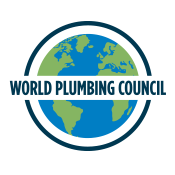Plumbing’s essential contribution toward solutions to the world’s water, sanitation and therefore health and amenity challenges has never been more critical.
Since 1990, when the World Plumbing Council (WPC) was established, 2.6 billion people have gained access to an improved water supply. That is a remarkable improvement, however there continues to be at least 660 million people without access to reliable and safe water in 2017.
At the other end of the economic development continuum, post-industrial economies are experiencing different plumbing related challenges. Some of the most developed economies in the world are facing serious health problems as a direct result of ageing plumbing infrastructure. Exposure to health risks from toxins such as lead and asbestos and waterborne diseases such as legionella are real and immediate problems for communities in highly developed economies.
The rapidly changing global climate adds another new and undefined element to the water and sanitation challenges the world faces. An increase in extreme weather events creates unprecedented risk of flooding, drought, erosion, turbidity, debris in reservoirs, nutrient and pollutant loading, and wildfires. It also impacts surface runoff and groundwater recharge rates.
Plumbers and the plumbing industry are at the forefront in creating and implementing the solutions to these problems. World Plumbing Day, held each year on March 11 promotes the role of plumbing in improving public health and safeguarding the environment, by uniting the World Plumbing Industry for the benefit of all.
Improved societal health and wellbeing, amenity of the built environment and environmental sustainability outcomes are key areas identified by the World Plumbing Council as being profoundly influenced by plumbing systems and the work of plumbers. This World Plumbing Day 2017 is an excellent opportunity to bring attention to the importance of Education, Industry and Regulation in achieving improved standards in each of these areas.
Education
The World Plumbing Council supports projects and initiatives around the world to promote education and training within the industry. The Community Plumbing Challenge, established in 2015 is a joint initiative between the World Plumbing Council and the International Association of Plumbing and Mechanical Officials {IAPMO). It was established with the purpose of working directly within communities to design, produce and install sustainable solutions in response to the problems of water supply quality and sanitation. The Challenge provides education and training opportunities for both the host communities and the participants.
This and several other global education and training initiatives such as the WPC’s scholarship programme are designed to promote industry participants gaining the skills needed to ensure access to safe and reliable water supplies and sanitation for their communities.
Industry
The Council is focused on bringing the global plumbing industry together to work collaboratively to promote the connection between good plumbing and the health, sustainability and prosperity of the broader community to policy makers and governments. As an organisation comprised of industry professionals, we are dedicated to showing leadership on issues that directly relate to plumbing in postindustrial as well as emerging economies. The WPC shares information to find the best solutions to problems faced by the industry and communities worldwide such as dealing with waterborne disease and toxin exposure as well as drought and flood risk associated with climate change.
Regulation
Improving global plumbing regulation and standards is a key focus of the World Plumbing Council’s promotion and advocacy efforts. Building climate-resilient economies that can develop and grow in a warming world requires improved allocation of scarce water resources, both across and within sectors, to its highest value uses. As well as achieving safety and sustainability objectives, regulations need to factor in economic opportunity.
World Plumbing Day is an opportunity to appreciate what we often take for granted. Access to safe drinking water and effective sanitation both make a significant contribution to health and well-being and act as an effective protection against the spread of diseases that could otherwise quickly decimate our communities.
The plumbing industry also creates employment and career paths for hundreds of thousands of people around the world. To be effective, plumbing systems need to be designed, installed and maintained by well-trained and equipped plumbing professionals. There are significant risks that undermine all this industry affords if those without the right skills and knowledge corrupt the protections good plumbing brings.
Well trained plumbers contribute daily to the health and amenity of our societies and increasingly to the sustainability of our environment. Let’s take time this March 11 to reflect on the contribution that plumbers make to our communities and our world.
Shayne La Combre

Chair
World Plumbing Council

